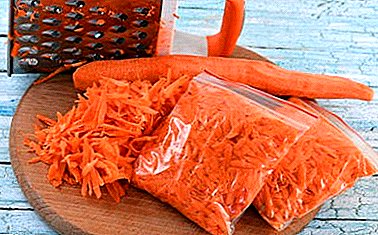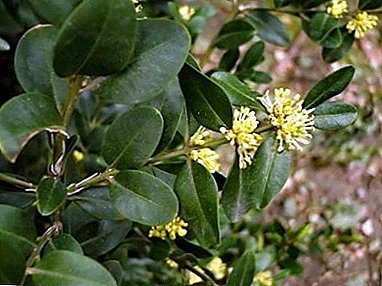
Currently, there are many varieties of carrots, one sown in spring, the other in winter. Some carrots are grown for long-term storage, another for spins, and a third is used as a substitute for harmful sweets.
Carrots contain a lot of vitamins and elements, which makes it not only a tasty delicacy, but also useful.
Many gardeners sow carrots in winter, and the most experienced choose for this variety of Moscow winter. More about this variety is described in this article.
Detailed characteristics and description of the variety

- Appearance. Moscow winter is a long, blunt cylindrical roots. The carrot is almost smooth, it has only small eyes. The color is bright orange, the head at the end of the vegetative period can change color to green or purple. Length 15-18 cm. It has a rounded core, small in size, the pulp is sweet and juicy.
- What sort of type is it?. Moscow carrots belong to the type of Chantenay. Carrots of this variety have a pleasant sweet taste. Fruits do not exceed 20 cm in length, have a rounded middle and a blunt nose.
- Amount of fructose and beta carotene. The amount of fructose in the Moscow winter varies from 7 to 8%, the amount of carotene does not exceed 13 mg.
- Sowing time. Moscow winter begin to plant when the air temperature drops to 5 degrees.
- Seed germination. Germination of this variety is about 85% of the total number of seeds.
- The average weight of 1 root. The average weight of a root about 90-170 gr.
- What is the yield of 1 ha. The average yield per hectare is about 30 tons. The maximum is about 100 tons.
- Assignment grade and keeping quality. Moscow winter is used both for long-term storage or spins, and for fresh consumption. The storage quality is good, this type of carrot, with proper storage, is going through the whole winter period without any problems.
- Growing regions. This variety of carrots can be grown anywhere in Russia, as well as Belarus and Ukraine. Most often it is used for sowing in places with a cold climate, for example, in the Leningrad region, in the Urals, in Siberia or in the Moscow region.
- Where it is recommended to grow. Carrots are grown in open ground, in very cold winters, it is additionally warmed with peat.
- Resistance to diseases and pests. The Moscow winter carrot has an average resistance to pests and crop diseases.
- Ripening. The ripening period varies from 60 to 120 days depending on the temperature of the air and the soil.
- What kind of soil prefers. This type of carrot prefers well-drained, neutral soil. Soil temperature should not be more than 7 degrees during planting seeds.
- Frost resistance. Seeds of this carrot are frost-resistant and are not afraid of low temperatures, however, shoots withstand a cooling of no more than -4 degrees, so in regions with harsh winters beds with carrots should be warmed with peat.
Breeding history.
Louis de Vilmorin first discovered the Shantane variety type as far back as 1856, he described the varieties currently being grown. The Moscow winter was bred a little later, it was crossed with winter varieties of carrots in order to adapt to low temperatures. Initially, it was going to be grown only in Moscow, but later it became popular in more northern areas.
What is the difference from other species?
Also Moscow winter has a large amount of carotene, which is preserved even when the carrots lie in the cellar for a long time. This variety is suitable for fresh consumption, as well as for twists, salads, storage.
Advantages and disadvantages
 disadvantages:
disadvantages:
- Moscow winter carrots do not tolerate dry periods;
- long sprouting.
Merits:
- resistance to diseases and parasites;
- resistance to tsvetushnosti;
- keeping quality (carrots can wait until their time until the summer);
- high yields (about 5-7 kg per 1 square meter);
- tastes of root crops and presentation of carrots;
- unpretentiousness;
- seeds are sown both in spring and in winter.
Features of growing
Moscow winter carrots planted after cucumbers and zucchini, or at the end of October, when the average daily temperature drops to 5 degrees. It is desirable that the area is well lit by the sun, the soil should be fertile and not acidic, it will help to achieve greater yield.
The best result Moscow winter will give on the cultivated loam. Seeds tolerate both snowy and snowless winters. When planting in winter, the land needs to be mulched, in the spring it will be necessary to use both mulch and irrigation.
Harvesting and storage
To understand whether the fetus is fully matured is not difficult. After ripening, the root crop is overgrown with small roots, its color becomes red-orange. He is easily pulled out of the ground. Most often maturation occurs in the middle or end of September.
Harvest is worth collecting in dry weather before the onset of the first frost. Moscow winter is sensitive to mechanical damage, damaged carrots will not be stored for a long time. The plant is cut immediately. Carrots intended for long storage can not be washed or cleaned from dirt.
After harvesting, the carrots are folded in a well-ventilated room to dry, and then transferred for 5-6 days in a dark cool room. After this procedure, carrots can be folded in boxes and sent for permanent storage in a shed or cellar.
Diseases and pests
The main pests affecting Moscow carrots:
- umbrella sheet;
- carrot fly;
- cabbage butterfly.
Diseases:
- Alternaria;
- fomoz.
Growing problems and solutions
Hitting rot
 Rotten carrots are not good for food, such roots should be destroyed. In no case do not leave carrots affected by rot for storage, it will continue to rot and infect other roots.
Rotten carrots are not good for food, such roots should be destroyed. In no case do not leave carrots affected by rot for storage, it will continue to rot and infect other roots.
If carrots are prone to rot, before planting next year should take preventive measures:
- Etch seeds before sowing.
- To reduce the acidity of the soil and fertilize, so that the soil becomes more fertile.
- Change the place of sowing carrots.
- During thin out crops.
- During the watering of crops, the beds can not be both dry out and unnecessarily fill.
- Avoid fertilizing with nitrogen, it is better to use phosphorus-potassium fertilizers.
- A month before harvesting plants should be treated Bordeaux liquid.
Cracks in the roots
- In order to bring the soil in order, use sapropel.
- Watering should be done 2-3 times a week, but so that the soil is saturated with 20-25 cm.
- Avoid the use of nitrogen fertilizers.
Unusual shape
Such vegetables are edible and do not lose their taste, but are poorly stored. To avoid changing the shape of carrots you need:
- Avoid introducing fresh manure before planting.
- Make the soil fertile.
- Water carrots 2-3 times a week.
Excess roots
 "Hairy" carrots do not lose their taste and is allowed for use in food, but it will not be stored for a long time.
"Hairy" carrots do not lose their taste and is allowed for use in food, but it will not be stored for a long time.
To get rid of the abundant growth of the roots is enough:
- During loosen the ground.
- Adjust the watering.
- Make the soil more fertile.
Bitter taste
If the carrot grew bitter, it means that its care technique was violated. To carrot was sweet and juicy, you need:
- During the spud.
- Adjust the watering.
- Do not forget about thinning.
- The roots that came out of the ground should be covered with earth.
Similar types of vegetables
- Grade "Niiokh 336" This variety is similar to the Moscow winter form, length and weight, also has excellent keeping quality and high content of carotene. Gives a great harvest.
- Grade "Emperor" as well as the Moscow winter one is resistant to tsvetushnosti, stored until the very summer, gives a high yield. It has a sweet and juicy flesh and sizes up to 170 cm.
- Variety "Samson" ripening occurs within 120 days after planting, is well stored, the average length is about 150 cm. Root crops are sweet and juicy. The variety is unpretentious and resistant to diseases and parasites.
- Sort "Gulchatay" retains useful properties for a long time, is stored for a long time, suitable for any kind of processing, as well as long storage and fresh consumption.
Moscow winter was in vain forgotten by gardeners. It has many advantages, contains a large amount of vitamins. It can be used anywhere, in spins, baby food, daily cooking. And proper care and timely planting and harvesting will help to achieve high yields. Such carrots will delight you all winter.












